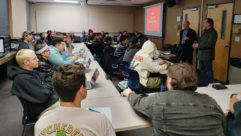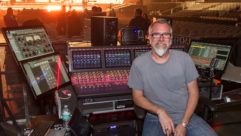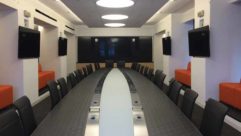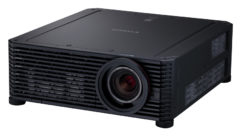
Blurred Lines
Dec 3, 2014 3:53 PM, By Les M. Goldberg
Event Staging or Production Company – Can You Do Both Successfully?
Times are changing in the live event industry. Companies are increasingly trying to be all things to all people. Event staging companies are evolving into all-inclusive one stop shops that offer everything under the sun, such as equipment, scenic, rigging, event management, and the most recent trend to appear, production and creative services. In response we are seeing the emergence of event production companies offering equipment staging services in order to compete in the marketplace. This one stop shop business model treads very dangerous waters and the impact could result in long term, damaging effects for end users seeking events with high production value.
Traditionally, a production company designs the content, and creates the messaging and concept for the customer, delivering the key product through video, graphics, and other visuals for all types of events. A producer utilizes an event staging company to deliver the video, audio, LED, lighting, and audiovisual equipment, and provide the technical labor to execute on their message and vision. A staging company’s job is to act as the equipment provider, and deliver gear that not only works, but can operate in different venues and environments, and support a variety of innovative productions.
The delineation between production services and equipment staging used to be very clear but with the advent of all-inclusive one stop shops surfacing across the industry the line is becoming more blurred. This trend has the potential to negatively impact the quality and creativity level currently seen throughout the meeting production industry. Simply put, production companies are hired for their ability to engage the audience through their imagination, vision, and creative messaging– they are the artists of the event staging world. In contrast, equipment staging companies, for the most part, are the engineers.
A production company that offers equipment staging as a service offering will normally support events from their own inventory of equipment, which will often be a narrow range of equipment. When limited by their own assets to produce a show and execute on a concept, these production companies are often required to reuse ideas and tools to deliver events for different clients. On the other hand, a company that offers strictly production services and utilizes an outside technical provider, has the advantage of focusing on creativity, and can shop around to find an equipment solution that will support their vision. A production-only company can also rely on outside equipment providers to stay up to date with the newest inventory on the market, and have access to a larger palette of the latest technology advancements to incorporate into events.
More commonly seen today, equipment staging companies are taking on production services are part of their expanding lineup of offerings. As the engineers and hardware providers of the event staging industry, creativity is not normally at the forefront of their level of expertise. Of course there are limited exceptions, but for the most part, an equipment staging company that offers creative production services is delivering a service outside of their wheelhouse. Most likely, they will not be able to achieve the high level of creative vision, concept, and messaging offered by an independent production company.
In an effort to capture more revenue, the sales pitch of these staging companies that offer creative and production services is to bundle the production support with the equipment, and provide the gear at a discount. This business model can be very dangerous for event staging companies. They are putting their relationships with event producers at risk by positioning themselves as direct competition. Event production companies that may have worked with these staging companies for equipment support in the past are suddenly put in the awkward position of having to compete with their former technical suppliers, and industry relationships become damaged.
There are exceptions to every rule, and there are companies that can successfully walk the line of providing both equipment staging and production services. For example, this business model can work well for supporting smaller meetings with lower budgets, or association meetings with planners that are very price conscious and less concerned with high production value and ‘wow’ factor. But, for medium-sized events, and especially for larger shows, clients should be leery of the one-stop shop equipment/ production company, and ask to see multiple examples of past work, as well as references from end clients where the firm successfully delivered both equipment and production services.
The industry will continue to evolve, and the actions that companies take today will shape the future of live events. Event one-stop shops are positioning themselves in a way that commoditizes production and creative services. If this trend continues, and more firms are forced to jump on the bandwagon in order to compete, companies that try to do everything well turn into jacks of all trades and masters of none. True creative production should come from the mind of truly creative producers, and equipment providers should focus on their expertise in event staging. Both are critical functions to the success of a high quality production and require discipline-specific specialists in their given fields. Stick to what you do well. Ask yourself– is your event staging company offering creative production services? You might find yourself contracting with your future competitor.
Les Goldberg is CEO of LMG, one of the world’s top AV staging companies.










